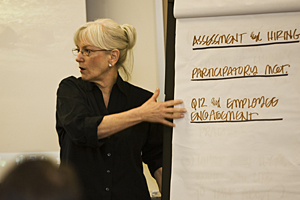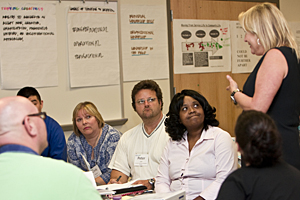
- Rozovsky wins prestigious NSF Early Career Award
- UD students meet alumni, experience 'closing bell' at NYSE
- Newark Police seek assistance in identifying suspects in robbery
- Rivlin says bipartisan budget action, stronger budget rules key to reversing debt
- Stink bugs shouldn't pose problem until late summer
- Gao to honor Placido Domingo in Washington performance
- Adopt-A-Highway project keeps Lewes road clean
- WVUD's Radiothon fundraiser runs April 1-10
- W.D. Snodgrass Symposium to honor Pulitzer winner
- New guide helps cancer patients manage symptoms
- UD in the News, March 25, 2011
- For the Record, March 25, 2011
- Public opinion expert discusses world views of U.S. in Global Agenda series
- Congressional delegation, dean laud Center for Community Research and Service program
- Center for Political Communication sets symposium on politics, entertainment
- Students work to raise funds, awareness of domestic violence
- Equestrian team wins regional championship in Western riding
- Markell, Harker stress importance of agriculture to Delaware's economy
- Carol A. Ammon MBA Case Competition winners announced
- Prof presents blood-clotting studies at Gordon Research Conference
- Sexual Assault Awareness Month events, programs announced
- Stay connected with Sea Grant, CEOE e-newsletter
- A message to UD regarding the tragedy in Japan
- More News >>
- March 31-May 14: REP stages Neil Simon's 'The Good Doctor'
- April 2: Newark plans annual 'wine and dine'
- April 5: Expert perspective on U.S. health care
- April 5: Comedian Ace Guillen to visit Scrounge
- April 6, May 4: School of Nursing sponsors research lecture series
- April 6-May 4: Confucius Institute presents Chinese Film Series on Wednesdays
- April 6: IPCC's Pachauri to discuss sustainable development in DENIN Dialogue Series
- April 7: 'WVUDstock' radiothon concert announced
- April 8: English Language Institute presents 'Arts in Translation'
- April 9: Green and Healthy Living Expo planned at The Bob
- April 9: Center for Political Communication to host Onion editor
- April 10: Alumni Easter Egg-stravaganza planned
- April 11: CDS session to focus on visual assistive technologies
- April 12: T.J. Stiles to speak at UDLA annual dinner
- April 15, 16: Annual UD push lawnmower tune-up scheduled
- April 15, 16: Master Players series presents iMusic 4, China Magpie
- April 15, 16: Delaware Symphony, UD chorus to perform Mahler work
- April 18: Former NFL Coach Bill Cowher featured in UD Speaks
- April 21-24: Sesame Street Live brings Elmo and friends to The Bob
- April 30: Save the date for Ag Day 2011 at UD
- April 30: Symposium to consider 'Frontiers at the Chemistry-Biology Interface'
- April 30-May 1: Relay for Life set at Delaware Field House
- May 4: Delaware Membrane Protein Symposium announced
- May 5: Northwestern University's Leon Keer to deliver Kerr lecture
- May 7: Women's volleyball team to host second annual Spring Fling
- Through May 3: SPPA announces speakers for 10th annual lecture series
- Through May 4: Global Agenda sees U.S. through others' eyes; World Bank president to speak
- Through May 4: 'Research on Race, Ethnicity, Culture' topic of series
- Through May 9: Black American Studies announces lecture series
- Through May 11: 'Challenges in Jewish Culture' lecture series announced
- Through May 11: Area Studies research featured in speaker series
- Through June 5: 'Andy Warhol: Behind the Camera' on view in Old College Gallery
- Through July 15: 'Bodyscapes' on view at Mechanical Hall Gallery
- More What's Happening >>
- UD calendar >>
- Middle States evaluation team on campus April 5
- Phipps named HR Liaison of the Quarter
- Senior wins iPad for participating in assessment study
- April 19: Procurement Services schedules information sessions
- UD Bookstore announces spring break hours
- HealthyU Wellness Program encourages employees to 'Step into Spring'
- April 8-29: Faculty roundtable series considers student engagement
- GRE is changing; learn more at April 15 info session
- April 30: UD Evening with Blue Rocks set for employees
- Morris Library to be open 24/7 during final exams
- More Campus FYI >>
4:22 p.m., July 29, 2009----Leaders in the developmental disabilities field met at the University of Delaware this summer to help assure the quality and commitment of the next generation of leaders for organizations serving people with developmental disabilities.
The National Leadership Consortium on Developmental Disabilities (NLCDD) at the Center for Disabilities Studies (CDS) at the University of Delaware held the Summer 2009 Leadership Institute, a conference featuring some of the biggest names in the field of developmental disability supports, from July 12-17.
The NLCDD is co-directed by Steven M. Eidelman, H. Rodney Sharp Professor of Human Services Policy and Leadership at the University of Delaware, and Nancy Weiss, a researcher at the Center for Disabilities Studies.
The 29 participants, who came from across the United States and as far as Italy and Canada, spent the week participating in group discussions, exercises and lectures in order to develop and enhance their leadership skills.
Eidelman came to UD in the fall of 2005 with the goal of focusing on developing the next generation of leaders for this quickly changing field. With that goal in mind, he developed the first National Leadership Institute, which took place in July 2006, and there have been two to three conferences held every year since then.
The leadership institute was partly created because there are concerns that many leaders of disability organizations are reaching retirement age and there is not a “next generation” of leaders prepared to move into these roles.
“We wanted to bring national and emerging leaders together and see what was possible,” Eidelman said. “So far, feedback has been very positive, and the institutes will be spreading throughout the country, led by UD.”
Goals of the leadership institutes include that participants learn about how to bring about the shift to individualized and responsive supports, rather than inflexible and congregate services, and that they commit to self-direction and the need for people with disabilities and their families to function as full participants and leaders in service delivery and system reform. Ideally, the participants will use the knowledge they have gained to become more effective leaders and use the connections they have gained to network around topics of system reform and the provision of quality supports.
“People come away with an understanding of their own leadership styles, their strengths and the areas on which they need to focus,” Weiss said. “They leave with a much fuller understanding of the ways in which the field is shifting -- including changes in the ways supports are offered, demographic changes, changes in funding and changes in service models.”
Weiss said the conferences have many advantages for individuals who want to make a bigger impact in the field.
“People are able to form a community and a network to help move their understandings and the field forward,” she said. “They can use the network of the 250 past graduates of the Leadership Institute to seek information, discuss ethical issues and to request resources.”
Tim Quinn, from The Arc Northern Chesapeake Region in Maryland, is a regular faculty member of the NLCDD leadership institutes and says he keeps coming back because the message of the institute is so valuable. At this summer's institute, he spoke about the transformation from traditional group home and sheltered workshop services to individual support services.
“We hear pretty unanimously that participants are terribly moved and get a positive impact out of these conferences. For some, it is even career-changing,” he said. “Many participants are state government officials and others who have impact on policy. The passion and energy they get from the leadership institutes go back to their organizations and they have an incredibly positive influence.”
The National Leadership Consortium on Developmental Disabilities is a partnership of nine major national developmental disability organizations. The goal of the consortium is to offer the necessary training for emerging leaders in the developmental field to embrace the values and build the skills necessary to work in government and nonprofit organizations that support people with developmental disabilities and their families.
Article by Jon Bleiweis
Photos by Ambre Alexander



